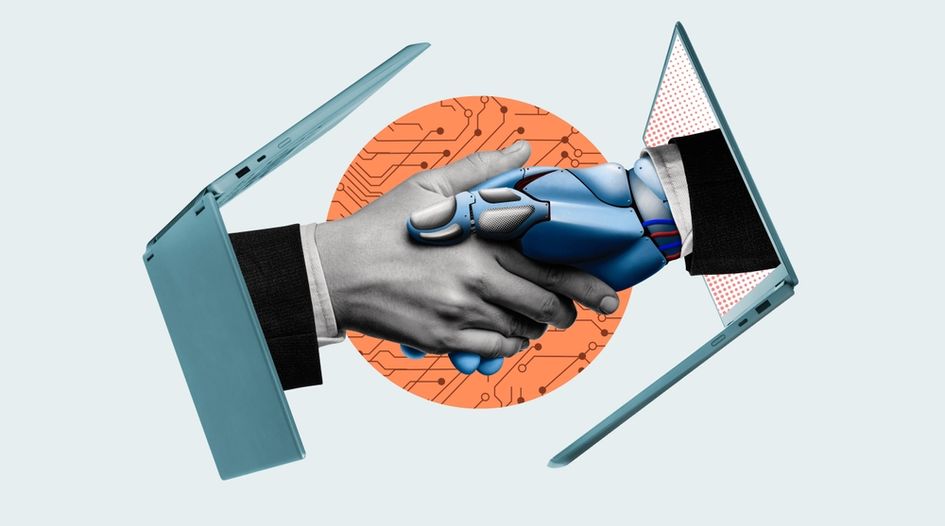Trademark professionals optimistic AI can be an “ally” – provided that people remain “the decisive factor”

As one of the most rapidly evolving technologies in the world, AI is a critical point of discussion for trademark experts. The risks and opportunities that come with using AI – both generatively and as a tool to improve efficiency – in private practice is a contentious topic, one that this year’s annual WTR Global Leaders have shared their insights into. Many are enthusiastic about AI’s implementation in the trademark landscape, but they emphasise that human judgement and expertise must endure alongside technological advancements.
A useful practice tool
Using AI as a tool in private practice has huge advantages. Michael Ritscher of MLL Legal sees “great potential when it comes to carrying out certain tasks faster and more cost effectively”. “It is part of our corporate strategy to utilise new technologies” and MLL is “currently evaluating a new system for the now large global portfolio of trademarks and designs that we manage for our clients”, he explains.
Similarly, Eryck Castillo at Uhtoff Gómez Vega & Uhthoff believes that the use of AI “will be a crucial factor to consider when managing high-volume portfolios”, and that it has already helped him to accurately manage cases.
Others champion the use of AI tools when it comes to searching extensive databases. James Luo at Lawjay Partners reports that “the utilisation of AI in identifying relevant legal precedents is invaluable”, and that its ability to “extract pertinent case law” can significantly expedite the research process. For firms like Lawjay Partners that “have a large clientele, AI’s application in language translation is a game changer”, Luo says. And it is not just big firms that benefit. AI presents opportunities for international firms to streamline their processes and for smaller firms to extend their client reach with access to AI language translation.
Elsewhere, Alessandro Cimaschi at Orange is equally enthusiastic about AI tools in private practice. “We are avid users of several third-party tools (for trademark searching, case law, portfolio management and renewals) that use AI in some way or another,” he says. Ray Lei Zhao at Unitatlen Attorneys also believes that “AI tools should be incorporated into [in-house] work, as they will help lawyers to do repetitive tasks much quicker and more efficiently”.
Despite AI’s capabilities when it comes to portfolio management, search processes and translation, some experts worry about its impact on their industry. Spring Chang at Chang Tsi & Partners warns that “intelligent consumption – which refers to consumer choices based on AI results – may lead to a decrease in the use of trademarks and the trademark system, which relies on the function of source identification and advertising. This could be affected by generative AI”.
Looking to the future of AI tools in private practice, Hui Huang at Wanhuida Intellectual Property predicts that “down the road, firms may reduce their numbers of supporting staff or use AI for certain associate work where appropriate”. This could be bad news for prospective trademark professionals looking to get their foot in the door.
Opportunities in generative AI
While there have been concerns over generative AI’s infringement potential, many of this year’s Global Leaders are optimistic about its impact on the trademark space.
Itai Sela Saldinger at Playtika has seen “gen-AI tools that are learning and being taught to respect trademarks and other IP rights and to work with brand owners”. In fact, he reports that “generative AI [is] being utilised to protect trademarks”.
Spring Chang also has a positive outlook on generative AI, especially when it comes to trademark registration. “Generative AI is capable of identifying conflicts in trademark applications and creating unique brand elements with identity recognition,” she says.
Embracing the “inevitable”
Many Global Leaders seem open to the potentials of AI, provided that there is transparency and a continued human element to its use.
“The use of AI, generative or otherwise, is probably inevitable in private practice provision,” admit representatives at HGF. While generative AI is useful for “augmenting” their services, client concerns must be addressed with “transparency and openness”, they insist – ensuring that they are clear about when and how AI applications are being used.
The “high premium on trust, confidentiality and ethical standards” in the legal profession necessitates a “careful” integration of AI into daily practice, adds Rahul Chaudry of Rahul Chaudry & Partners.
Meanwhile, there are some things AI simply cannot do. “Complex aspects of legal practice require human expertise, empathy and judgement,” says Zhao. Ik Hyun Seo at Cho & Partners recalls “many news stories of things turning out badly because lawyers relied too heavily and blindly on flawed AI technology without the necessary levels of human intervention”. His firm plans to adopt AI “cautiously” in light of such misgivings. Meanwhile, Rahul Chaudry & Partners “continues to value and prioritise human judgement, interpretation and discretion in handling complex legal matters”, agrees Chaudry.
Ultimately, “the intrinsic value of trademark law will never be replaced by AI”, says Chang. Instead, Marina Perraki at Tsibanoulis & Partners sees AI as an “ally” that can only “enrich and save costs rather than undermine the quality of legal work”.
AI will “in time bring about significant changes to the economy”, the reality of which is yet to be seen, predict HGF representatives. Yet regardless of how AI progresses, when it comes to trademark practice, “people are – and will remain – the decisive factor”, Ritscher insists.
Global Leaders is WTR’s annual opportunity to showcase some of the world’s top private practice trademark experts, allowing them space to share valuable insight into the most pressing issues dominating the IP landscape and their thoughts for the future. The full 2024 edition is available now.